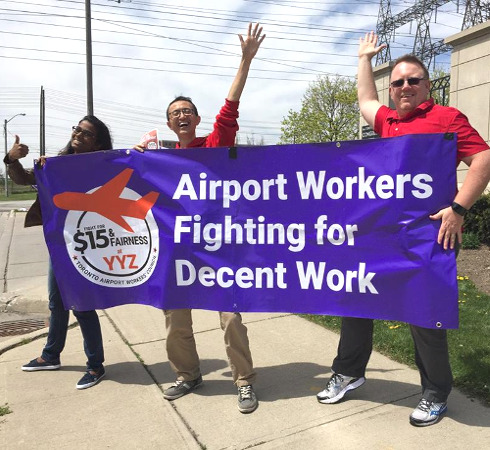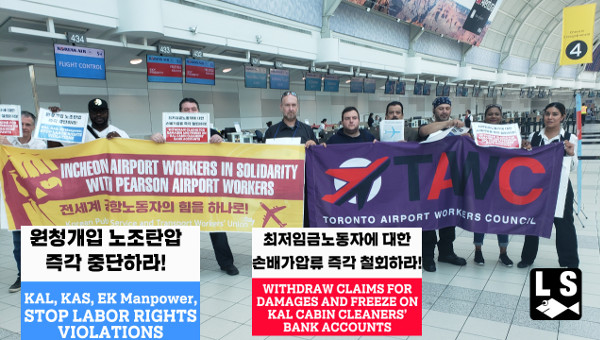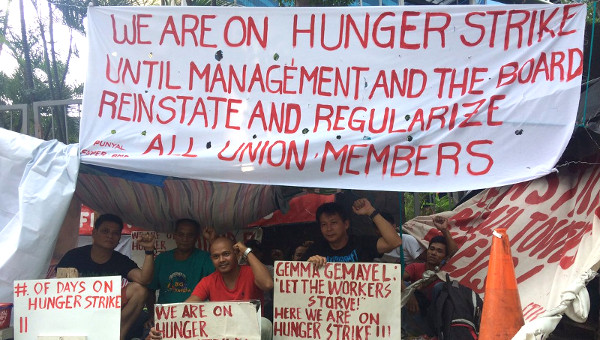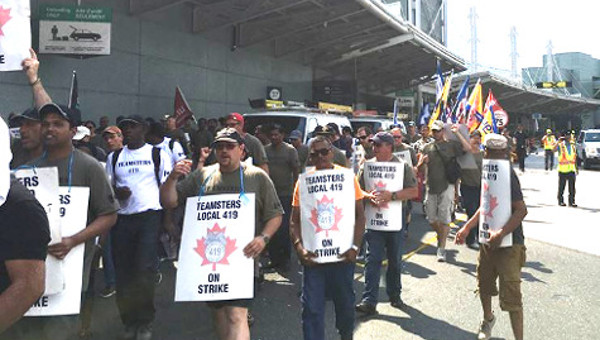Sean Smith interviewed by Tim Heffernan
Toronto’s Pearson International Airport is Canada’s busiest hub and is crucial to the economy. There are more than 40,000 employees working for over 400 employers at the airport, making it the largest workplace in Canada.
The following is an interview with Sean Smith, Mobilization Co-ordinator, UNIFOR 2002 and Representative, Toronto Airport Workers’ Council (facebook.com/TAWCYYZ). The interview was conducted by Tim Heffernan of Socialist Alternative, where it first appeared. The interview was conducted in April 2016. Here is a useful background story from the Toronto Star, April 2015.
Tim Heffernan (TH): Tell us about the issues facing workers at Toronto’s Pearson International Airport.
 Sean Smith (SS): Well, what’s unique about airline workers [and] that few people realise is that as the neoliberal era took off in the early 80s, the first part of the federal government that they privatized was Air Canada in 1987. I was an Air Canada worker at the time and if you look around the world you’ll see the same pattern emerging. In the U.S. the first wave was the deregulation of the airline industry under Jimmy Carter in 1978, in Canada it came a little bit later under Pierre Trudeau in 1982 and then the privatization of Air Canada. What this means is that as workers most affected on the front lines of neoliberalism, we have seen our working standards fall the quickest and the furthest from other public sector workers who privatized after us.
Sean Smith (SS): Well, what’s unique about airline workers [and] that few people realise is that as the neoliberal era took off in the early 80s, the first part of the federal government that they privatized was Air Canada in 1987. I was an Air Canada worker at the time and if you look around the world you’ll see the same pattern emerging. In the U.S. the first wave was the deregulation of the airline industry under Jimmy Carter in 1978, in Canada it came a little bit later under Pierre Trudeau in 1982 and then the privatization of Air Canada. What this means is that as workers most affected on the front lines of neoliberalism, we have seen our working standards fall the quickest and the furthest from other public sector workers who privatized after us.
When I started with the company in 1985, the bulk of the workers were full time and, in today’s money, making around $70,000 with full time pensions and benefits and travel privileges. Whereas if you look at today, it’s now multi-employer, no job security, there’s no regulation of our industry whatsoever, so you’ve seen stable jobs replaced by increasingly precarious, part-time contract work. That is why we needed to change this system of breaking down and creating divisions between labour. We needed workers to come together as a mass and say: “instead of us trying to respectively bargain individually with our employers, we’re going to bargain as one.” It’s not that radical a concept if you think about it, but it is in today’s context where everyone has separate unions and separate employers.
TH: Okay, so that brings me to the second question which is about the history of unions at Pearson and you’ve got a group called the Toronto Airport Workers’ Council. Can you say how that emerged, its composition, the different unions, and its relationship to the official union structures at Pearson?
SS: Its emergence is actually very basic. It’s just stopping for a moment and saying: “why are we doing what we’re doing?” and this example happened in the mid-1990s. Air Canada was doing another restructuring and we were called to a meeting with management.
TH: Who’s we?
SS: The IAM (machinists’ union) who represented ramp workers, CAW at the time – we represented the customer service workers, and CUPE, who represent the flight attendants. So we’re all sitting outside a manager’s office and each of us had a different appointment to go in separately and hear what they were going to do to us and we just said “why are we waiting to go in separately and then finding out what they said after? Let’s just all go in together to the room and say, ‘we’re here together, tell us what you usually [tell us] one-to-one to all of us together instead of giving different versions to each group’.” And the manager threw us out and said: “No, we do not do that, you cannot combine like this.” And so we held our ground and said: “no, we’re going to be together on this meeting,” and it turned into a major issue and, in the end, it was agreed upon that we could meet together. That doesn’t sound like very much but it was a huge victory and that began what was called the Airport Council of Unions.
Through the late 1990s, it was the Air Canada unions [that] would do this and we were making some gains. But then, unfortunately, the merger of Canadian Airlines [occurred] and then Air Canada went into bankruptcy, 9/11, all of these events then broke that initiative apart. In the late 2000s, after years of concessions, a few of us survivors from that era got together and said “let’s [revive] this again.” The impetus for that was after the government took away our legal right to strike as Air Canada workers in 2011-12. We said now we need to do things differently and instead of it just being an Air Canada council of unions, we made it an airport council of unions. It wasn’t just the Air Canada workers that were going through this neoliberalism but [all] airport workers, so we need to build broader class-based solidarity as opposed to the pattern in the past of Air Canada workers doing militant actions on their own and losing.
TH: It was a rank and file initiative?
SS: Yes, shop steward as opposed to rank and file but close to the floor, just the first level up. We were the shop stewards that were always the ones having to go to the meetings and we were just fed up saying why are we all going separately, let’s just go in together so it was very much a shop steward-led initiative and there was surprising opposition within some corners of senior leadership in some of our respective unions.
TH: One of the demands you’re taking up is the struggle for $15 an hour minimum. How does the struggle for $15 fit in with the broader issues, demands, of airport workers? As far as you know, what percentage of Pearson workers earn less than $15?
SS: Those are good questions. People think of the airport as well-paying, when you go through the airport you see people in suits and uniforms, everyone looks happy and professional. Because historically these are good paying jobs people just assume that everyone in those uniforms makes really good money. The reality is that increasingly, because of neoliberalization, because of deregulating our industry, these jobs are increasingly more and more precarious. So to give an example if you fly Air Transat on a vacation, the flight crews will still be Air Transat flight crews but everyone you meet until you get on the aircraft, even though they’re in Air Transat uniforms, will be workers contracted out by Air Transat and they’re contracted out at the lowest cost. So when you have the low-cost airport model the only way you can start doing it is find universal demands around the minimum wage. As I was saying earlier with the workers’ council, if we bargain a $15 minimum wage for one group of workers in a contract situation they’re just going to be undercut by the next contract worker, that’s why it needs to be a working class movement as opposed to a workplace specific movement and that’s what we’re working on.
TH: Are you linking up with other groups on the $15 an hour issue, for example the Ontario Federation of Labour, Fight for $15 and Fairness, broader community groups and, if you are, how is that working out?
SS: That is the biggest change that we have made in terms of our maturity and in terms of lessons we’ve learned from our early ‘90s experiment is that we cannot be insular. Neoliberalism is too deeply entrenched to just have one group of workers fight to fix their sector and hope that the other workers will do it in other sectors – this needs to be a broad class-based movement and we made a conscious effort of going into communities first. In the lead up to the Air Canada activism that we saw in 2011/2012, before we began our strike in June 2011 we went into the community for 6 months helping other community groups and helping other striking workers.
TH: Communities near the airport?
SS: Near the airport and the city of Toronto. The groups we focussed on were three groups: the fellow airport workers, so other unionized airport workers or airline workers in general going through issues, public sector workers and education workers. We felt we had most in common with them [because] we’ve been privatized and the education workers and public sector workers are under continual threat of being privatized so our trajectory is very similar to theirs although we’re just further down the road.
We worked very closely with those groups building up new strategies but also new consciousness. In order to build a working class movement you need to have broader understanding of issues that are class based, not just workers at the airport so it’s been very difficult for us but we always keep going back to the community and not only in Canada but around the world. A major struggle that we were involved in, and a victory, was in solidarity with the Philippine Airlines workers in Manila who for two years occupied a portion of the Manila airport when they were contracted out. And we actually had picket lines at the Toronto airport in solidarity with them, the first ever in Canada, where we set up strike lines and they won a victory and they got their jobs back – which was huge – and when they came out with their statement we were part of their statement.
TH: I didn’t know about that.
SS: Yeah, some amazing stuff that was happening. To give an example we had one international day of action – Toronto Island [Airport], the Porter airline workers were on strike, 22 of them. Due to these small numbers, the Wobblies [IWW] and our Council did all we could to maintain their strike through solidarity picketing. Then we said ‘now we’re sustaining you, you have to sustain someone else’. At the same time 305 Turkish Airlines workers in Istanbul were fired for attending a union rally. While their union was attending a grievance hearing to get their work back, a group of us, Porter workers and airport workers at Pearson occupied the Turkish Airlines headquarters here in Toronto in solidarity with the Turkish Airlines workers. At the same time Philippine Airlines workers occupied the Canadian consulate in Manila in support of the Porter workers, it was the first international solidarity – they went nuts. That was an actual time when what we did worked very well and all three ended up in victories, which was good.
TH: Following on that theme of internationalism, do you see any parallels with your fight for $15 or your issues generally and the fight for $15 in the U.S., the fight for better conditions at U.S. airports? Do you draw any lessons from the way $15 was achieved in Seattle and then in other cities? How do you see the political aspect of organizing? How important is that and in what form?
SS: Absolutely, it’s all the same struggle; neoliberalism is a global movement. Airports are the ports of the 21st century for globalization, everything goes through airports and the issues facing Canadian airport workers are the same facing American airport workers, facing airport workers around the world. The agenda is the same everywhere: deregulate the industry, privatize the flight carrier – in Canada’s case it was Air Canada – and then turn the airport administration into models that maximize profits as opposed to maximize community development. What those three formulas do is they suppress workers’ wages and working conditions. The only way you can overcome it, as opposed to trying to bargain 300 collective agreements – at Toronto airport there are over 300 employers – with good working conditions is get all the workers together and say: “enough, we’ve had enough.” A lot of inspiration came out of the U.S. – the inspiration not so much in terms of the concept because the concept’s been existing here in Canada, but the inspiration in terms that they were the first group to make wins. The American model is so inspiring because that’s the first group that we can turn [to] and say ‘they won something’. Airport workers around the world have all suffered. American workers were the first ones to make the victory which then gives inspiration, which is what they gave to the movement and it’s very good now.
Where Seattle comes into place – Seattle is different from Toronto because Toronto airport is in the Region of Peel. Region of Peel doesn’t even have an elected administration, it’s appointed. You cannot do a political organization when your government is appointed as a dictatorship, as the Region of Peel is. SeaTac, near Seattle, is a community that has an elected mayor, there you can do political organization. The challenge we have in airports is because we are federally and provincially regulated workers, we have two different labour codes in the same building. We’re in a non-democratic region, the 9051 is not Toronto, it makes it much more difficult. So Seattle is not a direct example in the sense of how to get there but Seattle is the example of what can be done. That matters. A more practical model for us is New York where the workers formed workers’ organizations and then agitated through direct action against the New York Port Authority to force the Port Authority to bring in wages. That’s what we’re doing against [our] airport authority because we have multiple jurisdictions. In New York, they have three airports in two different states – it makes it more difficult to have that as a political option so it’s more of a direct action.
TH: You have a big event planned for May 1st, May Day. Tell us about it.
SS: Absolutely. May Day is International Workers’ Day. Something we made a conscientious effort about as we decided to make a working class movement was to reclaim May Day as International Workers’ Day. That has been our day and so we make a point of every May Day doing actions on that day in support of our co-workers but also making a statement that this is our day. Last year, Air Canada workers took part in a wildcat strike for an hour opposed to contracting out and they were successful in achieving their goals. The year before there was another wildcat – parking attendants were being contracted out and they ended up blockading the parking garage. We have increasingly tried organizing around May Day, tried re-instilling our history which society has purged from our consciousness. So we have tried doing worker education, our first May Day action was actually a reading of “The Red Flag” in terms of what May Day means to workers, to just say this is what the history books have proved for us. The struggle for the 8-hour day, which is what inspired May Day is very much a battle we’re facing today, so it’s a natural fit for us and what we’re doing. Historically, all these actions at May Day is news to a lot of people because they were airport worker actions, they were done for ourselves. What is unique this year is we’re actually inviting the community to join us and say that this airport belongs to all of us. Our goal is to re-nationalize this airport and make it a public airport to benefit not only the workers but the entire community and since it’s a community airport that’s why we’re asking the community to join us and reclaim our airport as our own.
TH: So, final question, tell me about worker activist training that has taken place – you’ve been involved with that.
SS: Yes, and again it gets back to the question of raising working class consciousness. This is not taking away from union training. Union training is still going on in terms of being a union officer. What this is doing is actually asking workers – because workers have a role to play in their unions and this needs to be a worker led movement. So through the Toronto Labour Committee (formerly known as the Labour Committee of the Greater Toronto Workers’ Assembly), we’ve developed worker activist training that is not oppositional to their union but is basically saying this is why the struggles we’re in matter to us as workers and why we need to start building working class consciousness. It’s actually very much complementary to the union training but it’s for the workers. It has been very well received and we’re hoping to get more of it going because what we’re finding out is when the training’s done we have workers now wanting to organize co-workers which is what we need to do. So it’s been very successful, it’s something never tried before but so far it’s paying off.
TH: Anything else you want to say in conclusion?
SS: One thing I really want to stress is this is not oppositional to the unions, or it’s not a parallel structure or dual unionism, it’s just simply a new way of organizing within our current realities. Under Canadian law I can only bargain with my employer. That law has to change because that law no longer suits a neoliberal consciousness. You have workers contracted out so far from the work they’re doing there’s no longer a relationship between workers and the end product. The only way that’s going to change is by developing new working class organizations that can bring workers together in more meaningful coalitions as opposed to just me and my co-workers from my specific company trying to fight as one of 320 companies in an airport. That doesn’t work, that’s why we need to do this so it’s in many ways to strengthen our union movement that we’re doing this as well but we do the work that the unions can’t do. I think it’s very much a symbiotic relationship and I hope it’s one that will take off because we have to start looking at community organizing. •





